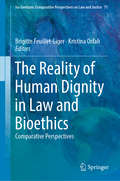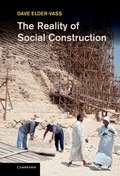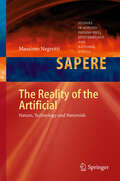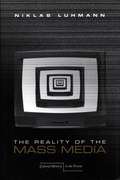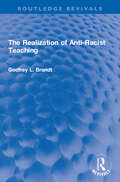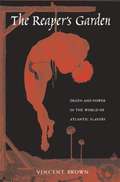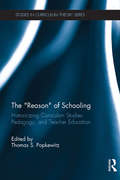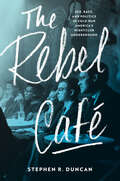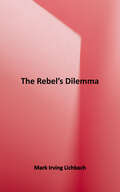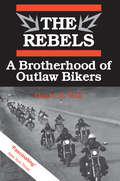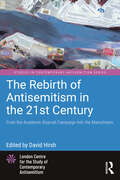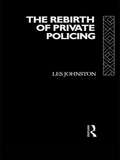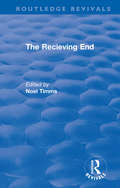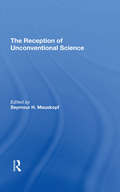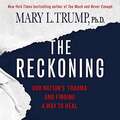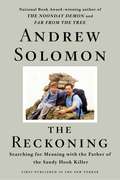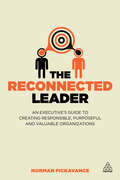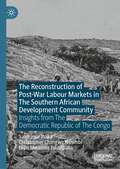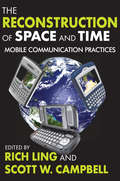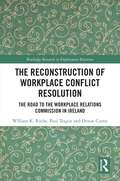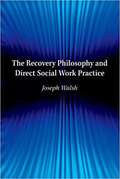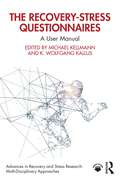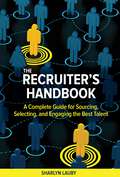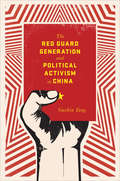- Table View
- List View
The Reality of Human Dignity in Law and Bioethics: Comparative Perspectives (Ius Gentium: Comparative Perspectives on Law and Justice #71)
by Brigitte Feuillet-Liger Kristina OrfaliAdopting an interdisciplinary perspective, this volume explores the reality of the principle of human dignity – a core value which is increasingly invoked in our societies and legal systems. This book provides a systematic overview of the legal and philosophical concept in sixteen countries representing different cultural and religious contexts and examines in particular its use in a developing case law (including of the European Court of Human Rights and of the Inter-American Court of Human Rights). Whilst omnipresent in the context of bioethics, this book reveals its wider use in healthcare more generally, treatment of prisoners, education, employment, and matters of life and death in many countries. In this unique comparative work, contributing authors share a multidisciplinary analysis of the use (and potential misuse) of the principle of dignity in Europe, Africa, South and North America and Asia. By revealing the ambivalence of human dignity in a wide range of cultures and contexts and through the evolving reality of case law, this book is a valuable resource for students, scholars and professionals working in bioethics, medicine, social sciences and law. Ultimately, it will make all those who invoke the principle of human dignity more aware of its multi-layered character and force us all to reflect on its ability to further social justice within our societies.
The Reality of Social Construction
by Dave Elder-Vass'Social construction' is a central metaphor in contemporary social science, yet it is used and understood in widely divergent and indeed conflicting ways by different thinkers. Most commonly, it is seen as radically opposed to realist social theory. Dave Elder-Vass argues that social scientists should be both realists and social constructionists and that coherent versions of these ways of thinking are entirely compatible with each other. This book seeks to transform prevailing understandings of the relationship between realism and constructionism. It offers a thorough ontological analysis of the phenomena of language, discourse, culture and knowledge, and shows how this justifies a realist version of social constructionism. In doing so, however, it also develops an analysis of these phenomena that is significant in its own right.
The Reality of the Artificial
by Massimo NegrottiThe human ambition to reproduce and improve natural objects and processes has a long history, and ranges from dreams to actual design, from Icarus's wings to modern robotics and bioengineering. This imperative seems to be linked not only to practical utility but also to our deepest psychology. Nevertheless, reproducing something natural is not an easy enterprise, and the actual replication of a natural object or process by means of some technology is impossible. In this book the author uses the term naturoid to designate any real artifact arising from our attempts to reproduce natural instances. He concentrates on activities that involve the reproduction of something existing in nature, and whose reproduction, through construction strategies which differ from natural ones, we consider to be useful, appealing or interesting. The development of naturoids may be viewed as a distinct class of technological activity, and the concept should be useful for methodological research into establishing the common rules, potentialities and constraints that characterize the human effort to reproduce natural objects. The author shows that a naturoid is always the result of a reduction of the complexity of natural objects, due to an unavoidable multiple selection strategy. Nevertheless, the reproduction process implies that naturoids take on their own new complexity, resulting in a transfiguration of the natural exemplars and their performances, and leading to a true innovation explosion. While the core performances of contemporary naturoids improve, paradoxically the more a naturoid develops the further it moves away from its natural counterpart. Therefore, naturoids will more and more affect our relationships with advanced technologies and with nature, but in ways quite beyond our predictive capabilities. The book will be of interest to design scholars and researchers of technology, cultural studies, anthropology and the sociology of science and technology.
The Reality of the Mass Media (Cultural Memory in the Present)
by Niklas Luhmann Kathleen Cross<p>In The Reality of the Mass Media, Luhmann extends his theory of social systems—applied in his earlier works to the economy, the political system, art, religion, the sciences, and law—to an examination of the role of mass media in the construction of social reality. <p>Luhmann argues that the system of mass media is a set of recursive, self-referential programs of communication, whose functions are not determined by the external values of truthfulness, objectivity, or knowledge, nor by specific social interests or political directives. Rather, he contends that the system of mass media is regulated by the internal code information/noninformation, which enables the system to select its information (news) from its own environment and to communicate this information in accordance with its own reflexive criteria. <p>Despite its self-referential quality, Luhmann describes the mass media as one of the key cognitive systems of modern society, by means of which society constructs the illusion of its own reality. The reality of mass media, he argues, allows societies to process information without destabilizing social roles or overburdening social actors. It forms a broad reservoir (memory) of options for the future coordination of action, and it provides parameters for the stabilization of political reproduction of society, as it produces a continuous self-description of the world around which modern society can orient itself. <p>In his discussion of mass media, Luhmann elaborates a theory of communication in which communication is seen not as the act of a particular consciousness, nor the medium of integrative social norms, but merely the technical codes through which systemic operations arrange and perpetuate themselves.</p>
The Realization of Anti-Racist Teaching (Routledge Revivals)
by Godfrey L. BrandtFirst published in 1986, The Realization of Anti-Racist Teaching explores the subject and importance of anti-racist education. The book examines the relationship between the educational debate at the level of academic institutions, professional organisations, and local education authorities within the context of the actual practice of teaching. It also questions how to link anti-racist theories put forward by theorists and activists to the practice of teachers. The Realization of Anti-Racist Teaching is a detailed discussion of the history of racism and of anti-racist teaching and education.
The Reaper's Garden: Death and Power in the World of Atlantic Slavery
by Vincent BrownBasing his study in Jamaica, Vincent Brown investigates what people thought about death in the world of Atlantic slavery. In his story of a world in flux he shows that death was as generative as it was destructive, and that the Grim Reaper became entwined in the social fabric of the island at the centre of the slave trade.
The Reason of Schooling: Historicizing Curriculum Studies, Pedagogy, and Teacher Education (Studies in Curriculum Theory Series)
by Thomas S. PopkewitzProblematizing the "reason" of schooling as historical and political, in this book leading international and interdisciplinary scholars challenge the common sense of schooling and the relation of society, education, and curriculum studies. Examining the limits of contemporary notions of power and schooling, the argument is that the principles that order school subjects, the curriculum, and teaching reforms are historical practices that govern what is thought, acted on, and talked about. Highlighting the dynamics of social exclusion, the normalizing of people through curriculum, and questions of social inclusion, The "Reason" of Schooling underscores the urgency for rethinking curriculum research.
The Rebel Café: Sex, Race, and Politics in Cold War America’s Nightclub Underground
by Stephen R. DuncanSubterranean nightspots in 1950s New York and San Francisco were social, cultural, and political hothouses for left-wing bohemians.The art and antics of rebellious figures in 1950s American nightlife—from the Beat Generation to eccentric jazz musicians and comedians—have long fascinated fans and scholars alike. In The Rebel Café, Stephen R. Duncan flips the frame, focusing on the New York and San Francisco bars, nightclubs, and coffeehouses from which these cultural icons emerged. Duncan shows that the sexy, smoky sites of bohemian Greenwich Village and North Beach offered not just entertainment but doorways to a new sociopolitical consciousness. This book is a collective biography of the places that harbored beatniks, blabbermouths, hipsters, playboys, and partisans who altered the shape of postwar liberal politics and culture. Throughout this period, Duncan argues, nightspots were crucial—albeit informal—institutions of the American democratic public sphere. Amid the Red Scare’s repressive politics, the urban underground of New York and San Francisco acted as both a fallout shelter for left-wingers and a laboratory for social experimentation. Touching on literary figures from Norman Mailer and Amiri Baraka to Susan Sontag as well as performers ranging from Dave Brubeck to Maya Angelou to Lenny Bruce, The Rebel Café profiles hot spots such as the Village Vanguard, the hungry i, the Black Cat Cafe, and the White Horse Tavern. Ultimately, the book provides a deeper view of 1950s America, not simply as the black-and-white precursor to the Technicolor flamboyance of the sixties but as a rich period of artistic expression and identity formation that blended cultural production and politics.
The Rebel Within: Joseph Stiglitz and the World Bank
by Ha-Joon Chang Joseph StiglitzCritique of the role and effectiveness of the World Bank.
The Rebel's Dilemma (Economics, Cognition, And Society Ser.)
by Mark I. LichbachSince the mid-1960s, theorists have elaborated over two dozen different solutions to the collective action problem. During this same period, students of conflict have explored many questions about protest and rebellion. The Rebel's Dilemma examines what happens when one brings the full richness of collective action theories to bear on the many complex problems of collective dissent. The book develops a new typology of solutions to the collective action problem: market, community, contract, and hierarchy. It then uses the typology to explain how the Rebel's Dilemma (i.e., the problem applied to collective dissent) is overcome by rebels. In placing two dozen different sets of solutions into this typology, four themes are developed. First, the Rebel's Dilemma is not all that much of a dilemma. If the collective action problem can be solved in some two dozen ways, it cannot pose an insurmountable hurdle for potential dissidents. Second, both dissidents and regimes know that the Rebel's Dilemma can be overcome. While dissidents try to solve their collective action problem, the regime tries to intensify that problem. This struggle over solutions to the collective action problem is the political struggle between regimes and oppositions. Third, analysts must specify the conditions under which collective action is effective. Finally, the collective action approach makes a major contribution to conflict studies. By dissecting the causes and consequences of solutions to the Rebel's Dilemma, the approach offers a set of implications that are far richer than anything offered by its competitors.
The Rebels
by Daniel R. WolfThe image of the outlaw biker is widely recognize in North American society. The reality is only known to insiders. To study the phenomenon of outlaw biker clubs, anthropologist Daniel Wolf bridged the gap between image and reality by becoming an insider. Disclaimer: Preliminary images removed at the request of the rights holder.
The Rebirth of Antisemitism in the 21st Century: From the Academic Boycott Campaign into the Mainstream (Studies in Contemporary Antisemitism)
by David HirshThe Rebirth of Antisemitism in the 21st Century is about the rise of antizionism and antisemitism in the first two decades of the 21st century, with a focus on the UK. It is written by the activist-intellectuals, both Jewish and not, who led the opposition to the campaign for an academic boycott of Israel. Their experiences convinced them that the boycott movement, and the antizionism upon which it was based, was fuelled by, and in turn fuelled, antisemitism. The book shows how the level of hostility towards Israel exceeded the hostility which is levelled against other states. And it shows how the quality of that hostility tended to resonate with antisemitic tropes, images and emotions. Antizionism positioned Israel as symbolic of everything that good people oppose, it made Palestinians into an abstract symbol of the oppressed, and it positioned most Jews as saboteurs of social ‘progress’. The book shows how antisemitism broke into mainstream politics and how it contaminated the Labour Party as it made a bid for Downing Street. This book will be of interest to scholars and students researching antizionism, antisemitism and the Labour Party in the UK.
The Rebirth of Private Policing
by Les Johnstonthese are just two of the issues addressed by Les Johnston, who argues that policing, far from being the exclusive preserve of public personnel, is an activity undertaken by a mixture of public, private, and quasi-public agents. His book reviews the history of private policing, examines developments of current concern, and finally considers the implications of these developments both for the sociology of policing and for a more general understanding of public-private relations in the late 20th century.
The Receiving End (Routledge Revivals: Noel Timms)
by Noel TimmsOriginally published in 1973, The Receiving End looks at the British welfare services for deprived children. The book is comprised of essays from individuals that have been on the receiving end of the social help agencies, such as adoption societies, fostering agencies and children’s homes. Each contributor provides a unique viewpoint of their own experiences, the experiences include chapters from those with experience of adopting a child, those that have been in the care of the local authority, and a first-hand account of a teenager in a psychiatric clinic. The book provides a valuable insight social work from the viewpoint of those receiving it. The book is still very much relevant today, and will be of interest to those working in the field of social work, or those studying social work.
The Reception Of Unconventional Science
by Seymore H MauskopfThe issue of perhaps greatest concern to historians of science today is the internalist-externalist dichotomy. This volume directly addresses that issue, at the same time providing a context for the serious study of heterodox science and scientific theories. The book consists of four studies, each of which considers the response of a scientific community to an unconventional theory or claim: the acausal physics of Heisenberg; Wegener's geological theory of continental drift; acupuncture; and the statistical argument for extrasensory perception. As they reveal a wide range of reactions to orthodoxy, the studies themselves exemplify the range of approaches the historian may use in examining scientific unconventionality.
The Reckoning: Our Nation's Trauma And Finding A Way To Heal
by Mary L. TrumpFrom the number-one best-selling author of Too Much and Never Enough: A diagnosis of America's national trauma, and a way to heal. The Reckoning will examine America’s national trauma, rooted in our history but dramatically exacerbated by the impact of current events and the Trump administration’s corrupt and immoral policies. Our failure to acknowledge this trauma, let alone root it out, has allowed it to metastasize. Whether it manifests itself in rising levels of rage and hatred, or hopelessness and apathy, the stress of living in a country we no longer recognize has affected all of us. America is suffering from PTSD - a new leader alone cannot fix us. An enormous amount of healing must be done to rebuild our faith in leadership, and our hope for this nation. It starts with The Reckoning.
The Reckoning: Searching for Meaning with the Father of the Sandy Hook Killer
by Andrew SolomonFirst published in The New Yorker, "Solomon tells the story of Peter Lanza, the father of Adam Lanza, the Sandy Hook Elementary shooter. Read it--it's moving, brave and just profoundly human and sad....There aren't any answers. And that's what makes this all so impossible, and Solomon's journalism so essential" (Salon.com). "Both parents loved Adam. Neither parent imagined or wanted their child's horrific end. This is why what Peter Lanza did by sharing his story with Andrew Solomon is so important. Lanza's story fills important gaps in our understanding of how a beloved child became a killer--and reminds us as a society that we have an obligation to help families and children before they find themselves on irreversible paths of violence" (Time).
The Reconnected Leader
by Norman PickavanceIn the aftermath of the global financial crisis, a scandal-ridden business world, and a deeply unstable business environment, trust in businesses and business leaders is at an all time low. The Reconnected Leader evaluates the current situation and sets out an eight-step model to implementing new practices that help leaders reconnect with their teams and reset the relationship the business has with all its stakeholders. It is up leaders to set long-term goals that, if achieved, will create lasting value for businesses and for the communities they serve. Drawing on case studies from international organizations and a sound theoretical underpinning, thought leader Norman Pickavance argues that the solution lies with leaders. The Reconnected Leader invites readers on a journey to rediscover the true purpose of their business and find more innovative solutions that integrate the challenge of long-term societal needs and short-term financial results.
The Reconstruction of Post-War Labour Markets in The Southern African Development Community: Insights from The Democratic Republic of The Congo
by Christopher Changwe Nshimbi Leon Mwamba Tshimpaka Saint José InakaThis book provides a comprehensive overview of post-war labour market reconstructions, in the context of a regional bloc whose member states have experienced conflict. Focusing on the Southern African Development Community (SADC) region, the book explores how major conflicts often expose shortcomings in affected countries particularly on their post-war labour market reconstruction processes. The authors discuss how countries in the SADC region in particular are equipped to navigate such processes. This key question drives the overview of relationships between labour market issues and wars of liberation from colonial rule and apartheid, rights to self-determination and racial (in)equality and the need to succinctly explain how labour market issues shaped civil wars in some post-independent SADC member states. The book examines the role of the state in reconstruction processes of post-war labour markets and the contribution of labour market institutions to these reconstructions. It further analyses private sector participation in remaking labour markets and workers’ experiences in finding employment in labour markets under reconstruction. The book provides specific insights from experiences in the Democratic Republic of the Congo (DRC).
The Reconstruction of Space and Time: Mobile Communication Practices
by Rich LingOne of the most significant and obvious examples of how mobile communication influences our understanding of time and space is how we coordinate with one another. Mobile communication enables us to call specific individuals, not general places. Regardless of location, we are able to make contact with almost anyone, almost anywhere. This advancement has changed, and continues to change, human interaction. Now, instead of agreeing on a particular time well beforehand, we can iteratively work out the most convenient time and place to meet at the last possible moment--on the way to the meeting or once we arrive at the destination.In their early days, mobile devices were primarily used for various types of emergency situations and for work. In some cases, the device was an essential element in various business operations or used so that overseas workers could communicate with their families. The distance between a remote posting and the people back home was suddenly and dramatically reduced. People began to share these devices not necessarily out of economic issues, but also questions of family and interpersonal dynamics.The process of sharing decisions as to who is a legitimate partner makes the nature of relationships more explicit. By examining the economy of sharing, we not only see how sharing mobile phones restructures social space, but are also given insight into an individual's web of interactions. This cutting-edge book deals with modern ways of thinking about communication and human interaction; it will illuminate the ways in which mobile communication alters our experience with space and time.
The Reconstruction of Workplace Conflict Resolution: The Road to the Workplace Relations Commission in Ireland (Routledge Research in Employment Relations)
by Denise Currie Paul Teague William K. RocheMany attempts have been made in recent decades by liberal market economies to reconstruct public workplace conflict resolution agencies in response to major changes in patterns of workplace conflict. These have often been hampered or stymied by political schisms, stalemate or inertia. The radical reconstruction of conflict resolution in Ireland marks out a major exception to the international pattern and represents a case of successful adaptation and innovation in conflict resolution services and supports. Drawing on detailed primary research, and aimed at scholars, policy makers, professionals and students, this book examines the drivers of innovation in the Irish case and shows how the new state agency for workplace conflict resolution, the Workplace Relations Commission, operates and maintains the confidence of employers, unions, people at work and government. The Irish case is considered in comparative context, and current strategic challenges facing the Workplace Relations Commission are assessed.
The Recovery Philosophy And Direct Social Work Practice
by Joseph WalshThe concept of recovery in mental health represents the radical shift from the reductive ideas of disease and cure to a holistic understanding of the individual. It is an investment in the personal journey toward wellness that involves developing hope, supportive relationships, self-motivation, social inclusion, and a greater sense of life's purpose. The principles behind the recovery movement mirror the NASW core values for the social work profession: emphasizing service and social justice through the empowerment and full engagement of the consumer in defining his or her strengths, needs, and goals. The Recovery Philosophy and Direct Social Work Practice explores the potential of the social work profession to use these core values to help persons with mental illness work toward recovery. <p><p> The book addresses the ways social workers can implement and support recovery activities through a consideration of recovery philosophy, the utilization of a social work perspective on recovery, and in-depth examples of recovery practice with individuals who have schizophrenia, depression, bipolar disorder, and autism spectrum. This book is a practical guide for direct practitioners. It emphasizes the cooperative dynamic of the social worker/consumer relationship and addresses the difficult topic of endings in recovery practice. The models presented in this book will enable social workers to expand their existing intervention skills to work more collaboratively with consumers toward their goals of holistic recovery from mental illness.
The Recovery-Stress Questionnaires: A User Manual (Advances in Recovery and Stress Research)
by Michael Kellmann K. Wolfgang KallusThe Recovery-Stress Questionnaires (RESTQs) identifies the current recovery-stress states and provides a complete picture of the actual extent of stress and recovery. Written to support those using the RESTQ, this manual offers advice on scope and application, facets of stress and recovery, versions and scoring, interpretation of results, and reliability and validity for each of the five forms of the questionnaire.The questionnaire is based on the hypothesis that an accumulation of stress in different areas of life, with insufficient opportunity for recovery, leads to a critical psychophysiological state. The RESTQ measures the frequency of current stress symptoms along with the frequency of recovery-associated activities to offer a differentiated picture of the current recovery-stress state. There are five forms of the RESTQ: a general version (RESTQ-Basic) with seven stress scales and five recovery scales is the foundation for the specific versions for athletes (RESTQ-Sport), for coaches (RESTQ-Coach), for children and adolescents (RESTQ-CA), and for the work context (RESTQ-Work). All versions take a modular structure and contain scales measuring specific aspects of stress and recovery in their field. These scales provide valuable information immediately on areas where improvement is needed in stress and recovery research across a range of applied settings.Drawing on experiences and scientific findings from sport to make them usable for an expanded understanding of recovery in the fields of health, work, and other related areas, this manual is written for the scientific community, applied psychologists and health scientists, and interested readers.
The Recruiter’s Handbook: A Complete Guide for Sourcing, Selecting, and Engaging the Best Talent
by Sharlyn LaubyEffective recruiting is more than filling jobs. It's about building trust and shaping organizational culture. The Recruiter's Handbook offers a comprehensive, step-by-step guide to the entire recruiting process, written by HR Bartender's Sharlyn Lauby, SHRM-SCP. With expert insights, tools and proven strategies, the book helps HR and talent acquisition professionals shorten learning curves, avoid legal missteps and create meaningful candidate experiences. It also includes specialized guidance on inclusive hiring practices, recruiting veterans and ex-offenders and building mentorship and internship programs. Ideal for both new and experienced recruiters, this practical guide is a trusted resource for building stronger teams and better hiring outcomes.
The Red Guard Generation and Political Activism in China (Studies of the Weatherhead East Asian Institute, Columbia University)
by Guobin YangRaised to be "flowers of the nation," the first generation born after the founding of the People's Republic of China was united in its political outlook and at first embraced the Cultural Revolution of 1966, but then split into warring factions. Investigating the causes of this fracture, Guobin Yang argues that Chinese youth engaged in an imaginary revolution from 1966 to 1968, enacting a political mythology that encouraged violence as a way to prove one's revolutionary credentials. This same competitive dynamic would later turn the Red Guard against the communist government.Throughout the 1970s, the majority of Red Guard youth were sent to work in rural villages, where they developed an appreciation for the values of ordinary life. From this experience, an underground cultural movement was born. Rejecting idolatry, these relocated revolutionaries developed a new form of resistance that signaled a new era of enlightenment, culminating in the Democracy Wall movement of the late 1970s and the Tiananmen protest of 1989. Yang's final chapter on the politics of history and memory argues that contemporary memories of the Cultural Revolution are factionalized along these lines of political division, formed fifty years before.
